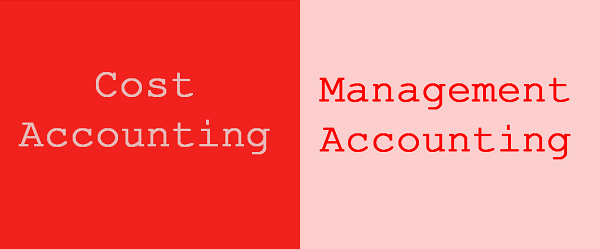By
- https://keydifferences.com/difference-between-cost-accounting-and-management-accounting.html
Cost accounting is that branch of accounting which aims at generating information to control operations with a view to maximizing profits and efficiency of the company, that is why it is also termed control accounting. Conversely, management accounting is the type of accounting which assist management in planning and decision-making and thus known as decision accounting.
The two accounting system plays a significant role, as the users are the internal management of the organization. While cost accounting has a quantitative approach, i.e. it records data which is related to money, management accounting gives emphasis on both quantitative and qualitative data. Now, let’s understand the difference between cost accounting and management accounting, with the help of given article.
Comparison Chart
| BASIS OF COMPARISON | COST ACCOUNTING | MANAGEMENT ACCOUNTING |
|---|---|---|
| Meaning | The recording, classifying and summarising of cost data of an organisation is known as cost accounting. | The accounting in which the both financial and non-financial information are provided to managers is known as Management Accounting. |
| Information Type | Quantitative. | Quantitative and Qualitative. |
| Objective | Ascertainment of cost of production. | Providing information to managers to set goals and forecast strategies. |
| Scope | Concerned with ascertainment, allocation, distribution and accounting aspects of cost. | Impart and effect aspect of costs. |
| Specific Procedure | Yes | No |
| Recording | Records past and present data | It gives more stress on the analysis of future projections. |
| Planning | Short range planning | Short range and long range planning |
| Interdependency | Can be installed without management accounting. | Cannot be installed without cost accounting. |
Definition of Cost Accounting
Cost Accounting is a method of collecting, recording, classifying and analyzing the information related to cost. The information provided by it is helpful in the decision-making process of managers. There are three major elements of cost which are material (direct & indirect), labor (direct & indirect) and overhead (Production, Office & Administration, Selling & Distribution, etc.).
The main aim of the cost accounting is to track the cost of production and fixed costs of the company. This information is useful in reducing and controlling various costs. It is very similar to financial accounting, but it is not reported at the end of the financial year.
Definition of Management Accounting
Management Accounting refers to the preparation of financial and non-financial information for the use of management of the company. It is also termed as managerial accounting. The information provided by it is helpful in making policies and strategies, budgeting, forecasting plans, making comparisons and evaluating the performance of the management.
The reports produced by management accounting are used by the internal management (managers and employees) of the organisation, and so they are not reported at the end of the financial year.
Key Differences Between Cost Accounting and Management Accounting
- The accounting related to the recording and analysing of cost data is cost accounting. The accounting related to the producing information which is used by the management of the company is management accounting.
- Cost Accounting provides quantitative information only. On the contrary, Management Accounting provides both quantitative and qualitative information.
- Cost Accounting is a part of Management Accounting as the information is used by the managers for making decisions.
- The primary objective of the Cost Accounting is the ascertainment of cost of producing a product, but the main objective of the management accounting is to provide information to managers for setting goals and future activity.
- There are specific rules and procedure for preparing cost accounting information while there is no specific rules and procedures in case of management accounting information.
- The scope of Cost Accounting is limited to cost data however the Management Accounting has a wider area of operation like tax, budgeting, planning and forecasting, analysis, etc.
- Cost accounting is related to ascertainment, allocation, distribution and accounting face of cost. On the flip side, management accounting is associated with impact and effect aspect of cost.
- Cost accounting stresses on short-range planning, but management accounting focuses on long and short range planning, for which it uses high level techniques such as probability structure, sensitivity analysis etc.
- While management accounting can’t be installed in the absence of cost accounting, cost accounting has no such requirement, it can be installed without management accounting.
Similarities
- Branch of Accounting
- Helpful in decision-making
- Prepared for a particular period.
- Not reported at the end of the financial year.
Conclusion
Both the cost accounting and management accounting are a part of accounting. They are helpful in for ensuring the smooth and efficient running of the business. On the basis of the information provided by the two entities various analysis are conducted. Cost accounting aims at reducing extra expenditure, eliminating unnecessary costs and controlling various costs. On the other hand management accounting aims at the planning of policies, strategy formulation setting goals, etc.

No comments:
Post a Comment